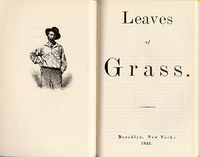Leaves of Grass: Difference between revisions
No edit summary |
No edit summary |
||
| Line 7: | Line 7: | ||
====Medium: [[:Category:Poetry|Poetry]]==== | ====Medium: [[:Category:Poetry|Poetry]]==== | ||
---- | ---- | ||
[[File:]] | [[File:Leaves_of_Grass_Book.jpg|right|200px]] | ||
'''Artist:''' Walt Whitman | '''Artist:''' Walt Whitman | ||
Revision as of 18:02, 6 December 2011
Date: 1882
Region: North America
Subject: Sexually Explicit,Sexual/Gender Orientation,Obscenity
Medium: Poetry
Artist: Walt Whitman
Confronting Bodies: Oliver Stevens, Boston District Attorney, New England Society for the Suppression of Vice, James R. Osgood
Dates of Action: 1882
Location: Boston, Massachussetts
Description of Artwork: Written by Walt Whitman, Leaves of Grass is a critically acclaimed collection of poetry. Walt Whitman spent his life editing and revising the collection though it was first printed in 1855. Some of his poems in the collection like, "Song of Myself, "I Sing the Body Electric" and "Pioneers, O Pioneers" have become enduring, celebratory anthems of Americana and are deeply embedded in the National psyche. Unlike other poetry of the time, which heavily employed allegory and symbolism and upheld religious and spiritual tropes, his poems predominantly engaged the body and the senses.
The Incident: Oliver Stevens, the District Attorney for Boston in cooperation with the New England Society for the Suppression of Vice wrote to Whitman's publisher, James Osgood demanding that certain poems with pronounced allusions to sex and sexual preference, such as "Song of Myself", be revised and that certain poems such as "A Woman Waits for Me" and "To a Common Prostitute" be removed from the collection. He wrote, "We are of the opinion that this book is such a book as brings it within the provisions of the Public Statutes respecting obscene literature and suggest the propriety of withdrawing the same from circulation and suppressing the editions thereof."
Results of Incident: Osgood asked Whitman to make the appropriate changes. He refused stating, "The list whole & several is rejected by me, & will not be thought of under any circumstances." Whitman went on to publish another edition of the collection later that same year with the direction of Rees Welsh & Company. The first printing of the new version sold out on its first day.
Source:
